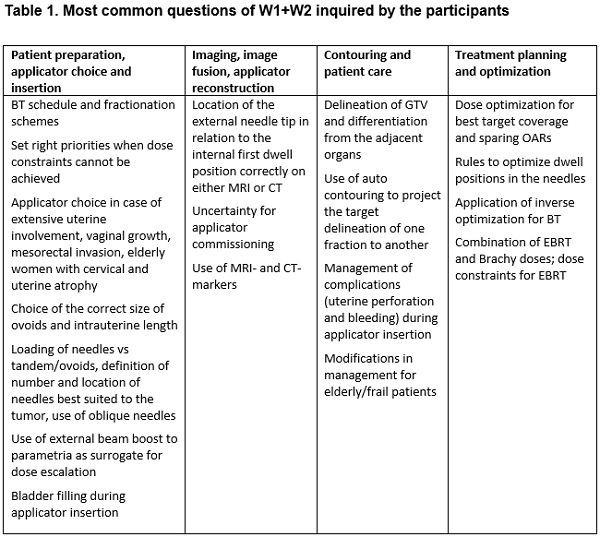Implementation of online workshops on IGABT in LACC: experience of BrachyAcademy
Elena Dizendorf,
The Netherlands
PD-0085
Abstract
Implementation of online workshops on IGABT in LACC: experience of BrachyAcademy
Authors: Elena Dizendorf1, Alina Sturdza2, Luca Tagliaferri3, Luca Russo4, Nicole Nesvacil2, Christian Kirisits2
1Elekta, Brachytherapy, Veenendaal, The Netherlands; 2Medical University of Vienna, Comprehensive Cancer Center, Radiation Oncology, Vienna, Austria; 3Fondazione Policlinico Universitario A. Gemelli IRCCS, Radiation Oncology, Rome, Italy; 4Fondazione Policlinico Universitario A. Gemelli IRCCS, Diagnostic Radiology, Rome, Italy
Show Affiliations
Hide Affiliations
Purpose or Objective
To support brachytherapy users during the COVID-19 pandemic and improve their confidence in image-guided adaptive brachytherapy (IGABT) in locally advanced cervical cancer (LACC), online workshops were developed and implemented by BrachyAcademy (non-profit peer-to-peer educational initiative in Elekta).
Material and Methods
In 2021-2022 two online workshops were organized. Each workshop was conducted over 6 hours in 2 consecutive days. Participating teams (min. 1 radiation oncologist/clinical oncologist (RO/CO) and 1 medical physicist (MP) from each hospital) had to send a complete clinical case of LACC including brachytherapy DICOM treatment files and questions to the faculty. During the workshop, feedback was given to each clinical case by 5 faculty members (2 RO, 1 Radiologist, 2 MP). Participants competed a post-workshop questionnaire which included combination of qualitative and quantitative questions via yes/no responses, Likert scale, and 1 to 10 scale. We describe curriculum deployment, questions raised by participants, feedback on clinical cases provided by teachers, and workshop evaluation by participants.
Results
21 teams from 8 countries (Europe, Asia, Latin America) participated in two online workshops. The total number of participants was 49: 23 RO/CO (47%), 22 MP (45%), and 4 RTT (8%). The clinical cases represented LACC with FIGO stages from IB3 to IVA.
We summarized the participant queries according to four workshop topics (Table 1).
During both, Workshop1 (W1) and Workshop 2 (W2) the following areas of improvement were identified by the faculty: familiarity with the GEC ESTRO and ICRU 89 recommendations for contouring and planning based on clinical drawings and MRI sequencing choice; appropriate selection of the applicator, including length, angle and diameter; experience in using the interstitial needles. Other shortages identified among the participants were: lack of verification of applicator digitization in 3D view after slice-by-slice reconstruction; wrong identification of applicator surface and consequential misplacement of the 3D applicator model due of vaginal packing; challenges with the dose optimization. All these issues were addressed during the workshop.
The participants rated both workshops with overall scores 8,3 for W1 and 8,5 for W2. In 82% participants the training course fully met expectations and in 18% partly for W1. For W2 76% had their expectations met completely and 24% partly. Participants also provided suggestions to improve the workshop content and organization, and proposed topics for future workshops: present clinical cases with complications and discuss how to handle them; present a challenging clinical case by the faculty; send one clinical case to all participants before the workshop and compare contouring and treatment planning results.

Conclusion
We successfully implemented the online workshops for BT. We encourage teams to organize similar trainings with discussion of clinical cases by multidisciplinary teams.